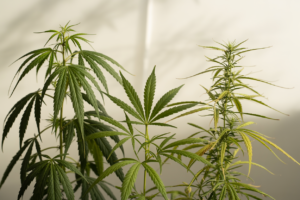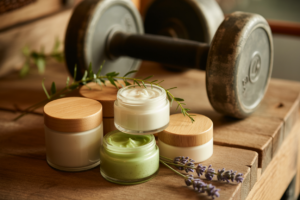- Research-backed guide to raw cannabis compound effects & therapeutic uses
The Power of THCA: Benefits, Uses, and Future Potential

Contents
Contents
Introduction
THCA (Tetrahydrocannabinolic Acid) is a special compound found in raw cannabis plants. Unlike THC, which makes people feel “high,” THCA is not psychoactive in its natural state. THCA might have some health benefits without the mind-altering effects that come with THC.
As more people look for natural wellness products, THCA is becoming popular for its possible health benefits. THCA turns into THC when heated, in a process called decarboxylation.
In this article, we’ll explore what makes THCA unique, its potential health benefits, and why more and more people are interested in this part of cannabis.
What is THCA?
THCA (Tetrahydrocannabinolic Acid) is a compound found in raw cannabis plants that doesn’t cause a “high.” It is the raw form of THC before it’s been heated or dried. Unlike THC, THCA won’t make you feel intoxicated, which makes it attractive to people who want the benefits of cannabis without the psychoactive effects.
Decarboxylation Process
THCA changes into THC through a process called decarboxylation. This happens when cannabis is heated, like when smoking or baking it. This process is what turns the non-psychoactive THCA into the psychoactive THC.
Growing Interest in THCA
People are becoming more interested in THCA because of its potential health benefits. Researchers and consumers alike are curious about how THCA can be used for natural health and wellness. Potential health benefits may include reducing inflammation, protecting brain cells, and more.
Chemical Structure
THCA’s chemical structure is slightly different from THC, which prevents it from binding easily to CB1 receptors, thus keeping it non-psychoactive.
THCA in Raw Cannabis
Certain strains of raw cannabis contain higher levels of THCA, which is why consuming fresh or minimally processed cannabis can be beneficial for those seeking THCA’s benefits.
How THCA Works in the Body
THCA works with the endocannabinoid system (ECS), which helps keep the body balanced. Unlike THC, THCA doesn’t attach strongly to CB1 receptors in the brain, which means it doesn’t make you feel high. Instead, it affects both CB1 and CB2 receptors indirectly, which may help reduce inflammation and protect nerve cells.
Comparison with THC
- THC: Binds strongly to CB1 receptors, causing psychoactive effects.
- THCA: Weak binding to CB1, so it doesn’t cause a high.
THCA may also help by stopping certain enzymes like COX-1 that cause inflammation. This might make it useful for pain relief without making you feel high.
- Neuroprotective Properties: THCA may protect nerve cells and support brain health, which could help with diseases like Parkinson’s and Alzheimer’s. Source
More studies are needed, but early research shows that THCA could help with conditions like arthritis and brain disorders.
Potential Health Benefits of THCA
Anti-Inflammatory Properties
THCA is known to help reduce inflammation in the body, which makes it a possible option for people with chronic conditions like arthritis. By working with the endocannabinoid system and blocking the COX-1 enzyme, THCA could reduce inflammation without the side effects of common medications.
Neuroprotective Effects
Some early research shows that THCA might protect brain cells. This means it could help with diseases like Parkinson’s and Alzheimer’s. THCA interacts with CB2 receptors to help protect the brain and nervous system.
Appetite Stimulation and Anti-Nausea Effects
THCA can help increase appetite and reduce nausea, similar to THC but without the high. This could be helpful for people undergoing treatments like chemotherapy.
Anticancer Potential
Some early studies suggest THCA might help stop certain cancer cells from growing. More research is needed, but it shows promise for future cancer treatments.
Risks and Side Effects of THCA
Even though THCA is non-psychoactive and has possible benefits, it’s important to understand any potential risks. Being informed about side effects helps ensure safe use.
Additional Study Insights Source
Recent research into cannabis-based products, including THCA, highlights both the potential therapeutic effects and the challenges. Medical cannabis use has been linked to mixed outcomes across different conditions, and there are documented associations with increased risk for mental health concerns such as depression, anxiety, and cognitive impairment. The need for larger and more rigorous clinical trials is evident to fully understand both the benefits and the risks involved. As with any supplement, using THCA should be done with caution, ideally with the advice of a healthcare provider.
Limited Research
There is still limited information about the long-term effects of using THCA. More studies are needed to better understand how safe it is over time.
Potential Drug Interactions
THCA might interact with certain medicines, especially those that affect the liver or are processed by enzymes like cytochrome P450. It’s best to talk to a doctor if you’re taking other medications.
Lack of Regulation
Right now, THCA products are not well-regulated, which means the quality of products may vary. Users should be careful about product potency and possible additives.
Potential Side Effects
Some possible side effects could include:
Legal Considerations
The legal status of THCA varies depending on location, and its legality often changes once THCA is heated and turns into THC.
THCA vs. CBD and THC
Understanding the differences between THCA, CBD, and THC is important for anyone interested in cannabis products. They all come from cannabis, but they have different effects on the body.
THCA vs. CBD
Both THCA and CBD don’t make you feel high.
- CBD is known for helping with anxiety, pain, and inflammation.
- THCA also helps with inflammation, but it is mainly found in raw cannabis and needs special care to stay in this form.
THCA vs. THC
- THC: Makes you feel high by binding to CB1 receptors in the brain.
- THCA: Has a different structure that keeps it from binding strongly to CB1 receptors, so it doesn’t cause a high unless heated.
Usage Differences
- CBD: Used in oils, tinctures, edibles, and creams.
- THCA: Usually taken in raw forms like juicing or tinctures.
- THC: Mostly used for recreational or medical purposes for its psychoactive effects.
| Property | THCA | CBD | THC |
|---|---|---|---|
| Psychoactive | No | No | Yes |
| Main Benefits | Anti-inflammatory, neuroprotective, anti-nausea | Anxiety relief, pain management, anti-inflammatory | Pain relief, psychoactive effects, appetite stimulation |
| Common Forms | Raw cannabis juice, tinctures, topicals | Oils, tinctures, edibles, topicals | Smoking, vaping, edibles, tinctures |
| Legal Status | Varies; generally non-psychoactive until decarboxylated | Widely accepted | Strictly regulated in many regions |
How to Use THCA: Products and Consumption Methods
You can use THCA in different ways, each with its own benefits. To keep THCA non-psychoactive, it must be used without heating it. Here are some common methods:
Raw Cannabis Juice
One easy way to take THCA is by juicing raw cannabis leaves. This:
- Keeps THCA from turning into THC
- Provides natural benefits without psychoactive effects
- Can be mixed with other juices for better taste
THCA Tinctures
Tinctures let you take specific doses:
- Usually made with alcohol
- Can be taken directly or added to food and drinks
- Lasts longer than raw cannabis
Topicals
THCA can also be used in creams or balms:
- Helps with localized pain and inflammation
- No need to ingest it
- Applied directly to problem areas
Product Quality and Sourcing
When buying THCA, make sure:
- The cannabis is organic and pesticide-free
- Products are tested by third-party labs
- It’s stored properly to keep the THCA active
| Method | Ease of Use | Onset Time | Duration | Best For |
|---|---|---|---|---|
| Raw Juice | Moderate effort | Slow (1-2 hours) | Short (2-4 hours) | People wanting natural wellness without a high |
| Tinctures | Easy to measure | Moderate (30-60 minutes) | Medium (4-6 hours) | Daily health use and easy dosing |
| Topicals | Easy to apply | Varies (15-30 minutes) | Varies (depends on area) | Targeted relief for specific aches and inflammation |
FAQs About THCA
As THCA becomes more popular, many people have questions. Here are some common ones:
Q: Does THCA get you high?
A: No, THCA is non-psychoactive and doesn’t cause the “high” that THC does. It only becomes psychoactive when heated.
Q: What are the benefits of THCA compared to CBD?
A: THCA may help with inflammation, protect nerve cells, and fight nausea, while CBD helps with anxiety, pain, and inflammation. Both do not cause a high but work differently in the body.
Q: Is THCA legal?
A: The legality of THCA depends on where you are. It’s usually legal until it’s heated and turned into THC. Check your local laws.
Q: How is THCA different from THC?
A: THCA is the raw form of THC. It doesn’t bind well to brain receptors like THC, which is why it doesn’t make you high unless heated.
Q: Can THCA be detected in drug tests?
A: THCA itself is not usually tested for in standard drug tests. However, if THCA is heated and converts to THC, it could be detected as THC in a drug test. It’s important to be cautious, as using THCA products might lead to positive results if they contain even small amounts of THC.
Q: How should THCA products be stored?
A: THCA products should be stored in a cool, dark place away from direct sunlight and heat. Proper storage helps maintain THCA’s stability and prevents it from converting into THC. Keep products in airtight containers to protect them from moisture and air exposure.
It’s important to remember that while this FAQ provides general information, it’s always best to talk to healthcare experts for specific medical advice and legal information about THCA.
Conclusion: The Future of THCA
THCA has a lot of potential for health benefits without making people feel high. Interest in THCA is growing, and research is starting to show how it can help with different conditions.
However, there are still challenges, like product quality and laws that need to be clearer. As research continues, THCA may become an important part of natural health products. To fully enjoy its benefits, people should stay informed and work with healthcare professionals.
Other Academic Work on THCA
Research on tetrahydrocannabinolic acid (THCA) has expanded significantly, exploring its biochemical properties, therapeutic potential, and genetic factors. Below are key studies and reviews that contribute to the understanding of THCA:
Biochemical Studies
- Biosynthesis in Yeast: A study explored the heterologous biosynthesis of THCA in yeast, providing insights into metabolic pathways and potential biotechnological applications for producing cannabinoids in non-cannabis organisms Source.
- Affinity and Efficacy at Cannabinoid Receptors: Research evaluated the binding affinity of THCA-A at cannabinoid receptors CB1 and CB2. The findings indicated that THCA-A has a lower binding affinity compared to THC, suggesting limited psychoactive effects but potential for therapeutic applications Source.
- Metabolism Studies: A study focused on the metabolism of THCA in rats, identifying various metabolites and confirming that oral intake of THCA can lead to the formation of THC. This research highlights the pharmacokinetics of THCA when consumed Source.
Therapeutic Potential
- Anticonvulsant Effects: An investigation into the anticonvulsant properties of THCA revealed mixed results across different seizure models. While some effects were observed, the results indicated both anticonvulsant and proconvulsant activities depending on the context Source.
- Anti-tumor Activity: In vitro studies assessed novel cannabinoids derived from THCA and their effects on various human tumor cell lines. The results demonstrated significant growth inhibition in several cancer types, suggesting potential anti-cancer properties of THCA derivatives Source.
- Critical Review of Therapeutic Perspectives: A comprehensive review discussed the pharmacological profile of THCA, emphasizing its anti-inflammatory, neuroprotective, and antineoplastic properties despite its non-psychoactive nature. This review calls for more attention to be given to THCA in therapeutic contexts Source.
Genetic Factors
- THCA Synthase Polymorphisms: Research examined genetic variations in the THCA synthase gene to distinguish between marijuana and hemp strains. This study is particularly relevant in light of legal changes regarding cannabis cultivation and product classification Source.
These studies collectively highlight the multifaceted nature of THCA, showcasing its biochemical properties, potential therapeutic benefits, and genetic implications within cannabis research. As interest continues to grow, further investigations will likely uncover more about this intriguing compound.
Disclaimer: The information provided in this newsletter is for general informational purposes only. All views expressed are our own and do not constitute financial, legal, or medical advice. We encourage readers to consult professionals regarding specific concerns or questions.
Subscribe to Our Newsletter: Stay ahead with insights, updates, and expert tips straight to your inbox! Subscribe to our newsletter for the latest trends, exclusive offers, and valuable resources tailored just for you. Don’t miss out—join our community today!




